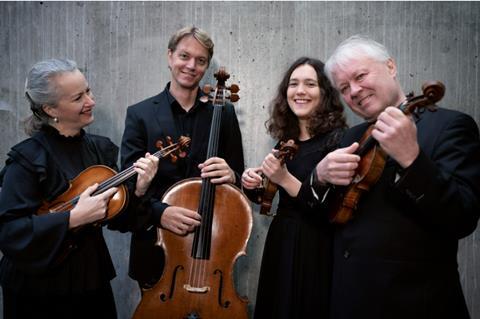Peter Quantrill attends the performance of Mozart, Bartók, Maja Ratkje and Fanny Mendelssohn at London’s Conway Hall on 21 April 2024

Mozart’s ‘Prussian’ Quartets are not as frequently programmed as they might (or should) be, and this fine Norwegian ensemble has set down an exemplary modern recording of them (for Lawo). In the event, however, anticipation had to yield to reality in K589, because leader Arvid Engegård seemed out of sorts and not disposed to mesh with his colleagues. Some brittle tone and rigid rhythms persisted in Bartók’s Third Quartet, though muscular confidence and collective musicianship won out, with violist Juliet Jopling forming a bridge of contact between the others.
In footballing terms, half-time oranges and a pep-talk must have raised their game, and the Engegård played much more as a team in the second half. Having commissioned A Tale of Lead and Light from fellow Norwegian Maja Ratkje in 2011, the quartet persuasively staged her taut drama, based on motifs from Beethoven’s ‘Rasumovsky’ no.1, in which carefree play is overtaken by anxiety and then catastrophe.
Read: ’It’s awful to hear yourselves back and realise that it’s way too obvious’ – Engegård Quartet
Read: Engegård Quartet announces new second violinist
Read: ‘Music and Mozart have been life savers’ - The Engegård Quartet
The gestural vocabulary of Ratkje’s clouded tonal harmony feels familiar from Schoenberg and Ligeti, but the course of events is compelling enough. Likewise, the taut 20-minute span of Fanny Mendelssohn’s Quartet in E flat major packs in some vividly Beethovenian ideas, which struggle to define themselves against the backdrop of her brother’s quartet writing. A halting pathos to the Romanze, however, strikingly anticipates Felix’s tribute to the memory of his sister in his own F minor Quartet, and the Engegård coloured it with the kind of Mozartian ambivalence of sunshine and showers which would have been welcome in the opening work.
PETER QUANTRILL











































No comments yet